Related Research Articles
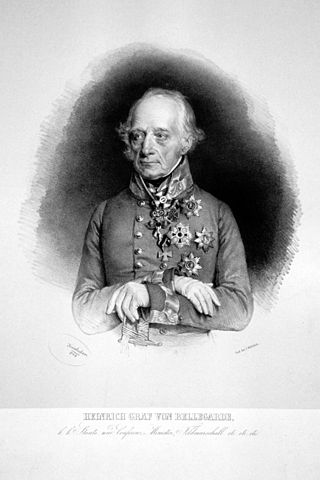
Count Heinrich von Bellegarde, Viceroy of Lombardy-Venetia, of a noble Savoyard family, was born in Saxony, joined the Saxon army and later entered Habsburg military service, where he became a general officer serving in the Habsburg border wars, the French Revolutionary Wars and the Napoleonic Wars. He became a Generalfeldmarschall and statesman.

Friedrich Karl Ludwig, Duke of Schleswig-Holstein-Sonderburg-Beck was the ninth and penultimate Duke of Schleswig-Holstein-Sonderburg-Beck. Friedrich Karl Ludwig was the son of Prince Karl Anton August of Schleswig-Holstein-Sonderburg-Beck and his wife Countess Charlotte of Dohna-Schlodien.

The German ancient noble family of Pfuel arrived in Brandenburg in the year 926 and later widened their influence to Saxony, Saxony-Anhalt, Mecklenburg, Pomerania, Württemberg, Westphalia, Eastern Europe and Sweden.
Friedrich August Peter von Colomb was a Prussian general.
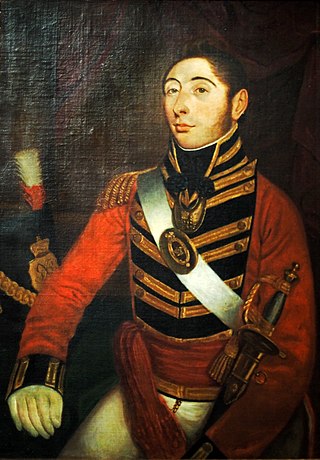
Christian Friedrich Wilhelm Freiherr von Ompteda was a Hanoverian officer of the Napoleonic Wars.

Carl Heinrich von Wedel was a Prussian lieutenant general in the War of Austrian Succession (1740–1748), the Seven Years' War (1756–1763), and the War of Bavarian Succession (1778–1779). He fought most notably in the Battle of Tornow in 1758, and the Battle of Kay in 1759. He was instrumental in Frederick the Great's victory at Leuthen in December 1757.

Friedrich Johann Daniel Alois, Freiherr von Zoller was a Bavarian lieutenant-general who fought in the Napoleonic Wars.

Friedrich Wilhelm Quirin von Forcade de Biaix, baptized Quirin Frideric de Forcade, aka Friedrich Quirin von Forcade, aka Frédéric Quérin de Forcade was a Royal Prussian Lieutenant General, the second son of Jean de Forcade de Biaix, an early Huguenot immigrant to Brandenburg-Prussia and a descendant of the noble family of Forcade. He was one of Frederick the Great's most active and most treasured officers. He was wounded three times and once left for dead on the battlefield. Together with his wife, he fathered 23 children.
Friedrich Wilhelm Leopold Konstantin Quirin Freiherr von Forcade de Biaix, aka Friedrich Wilhelm Leopold Konstantin Quirin von Forcade de Biaix, Herr of Schleibitz, Hamm, Groß-Naedlitz and Loslau, aka the Baron von Forcade,, Royal Prussian Major, Knight of the Iron Cross 2nd Class on 26 August 1813, knighted by His Majesty Frederick William III of Prussia as Knight of the Order of Saint John in 1817, Royal Prussian Chamberlain (Kammerherr) and Castellan (Drost) of Neuenrade in the County of Mark, after his father's death in 1808. He was also a publisher, author, and theater director.
Friedrich Wilhelm von Forcade de Biaix, aka Frideric Guillaume de Forcade was a Royal Prussian Colonel, Schwadronschef of the 2nd Grenadier Company in the 24th Prussian Infantry Regiment, recipient of the Kingdom of Prussia's highest military order of merit for heroism, Knight of the Order of Pour le Mérite (1774), Commandant of Frankfurt/Oder, and Presbyter of the French congregation of Frankfurt/Oder.
Karl Georg Heinrich Bernhard von Poten, known as Bernhard von Poten, was a royal Prussian colonel best known for his military writing.
Wolf Frederick von Retzow, Prussian Lieutenant General during the Seven Years' War, was born in 1699 on the Estate Möthlow near Nauen in the Märkisch Luch. He died of dysentery on 5 November 1758 in Schweidnitz.
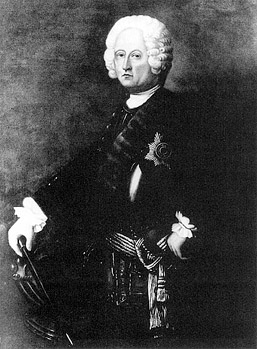
Christian Nicolaus von Linger was a Prussian general. He was chief of the Prussian artillery from 1716. In his 67-year military career, he served three monarchs in six wars, and founded the Prussian artillery arm of the military. He was appointed the first General of the Artillery by King Frederick II in 1744.
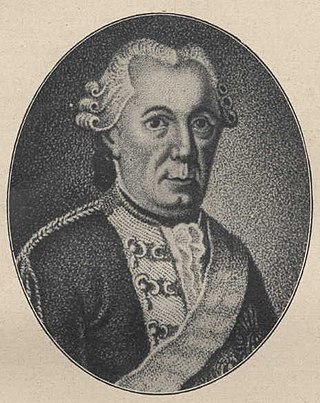
Anton Friedrich von Krockow (4 January 1714 – 7 September 1778) was a Prussian lieutenant general.

Karl Friedrich von Moller was a Prussian colonel of artillery. His uncanny genius at setting up artillery parks gave Frederick the Great high confidence in the artillery's ability to effect the outcome. During the Seven Years' War, Moller gained great fame specifically for his actions at Lobositz, Rossbach and Zorndorf.
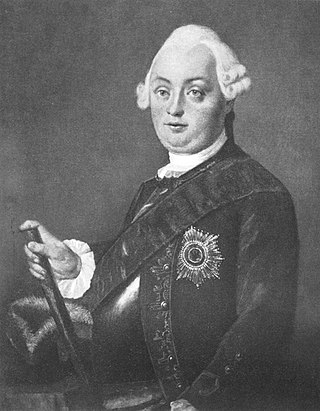
Joachim Friedrich von Stutterheim („Alt-Stutterheim“),. He was known as the Old Stutterheim to distinguish him from his younger brother, Otto Ludwig (1718–1780), also a lieutenant general in Frederick the Great's army.

Friedrich Wilhelm Graf von Bismarck was a German lieutenant general, diplomat and military writer. He wrote several major military-political works and military histories, which were very pro-Napoleon.

Johann Bonaventura von Rauch was a Prussian Army major general. His sons Gustav, Leopold and Friedrich Wilhelm also took up military careers and became general as well.

Heinrich Karl Ludwig Adolf von Glümer was a Prussian general who served in the Austro-Prussian and Franco-Prussian wars.
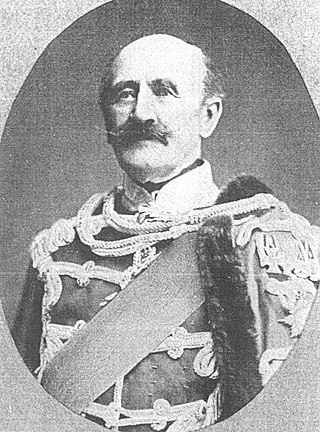
Otto Rudolf Benno Hann von Weyhern Sr. was a Prussian General of the Cavalry during the First Schleswig War, the Austro-Prussian War and the Franco-Prussian War. He commanded the 2nd Cavalry Division during the Battle of Königgrätz.